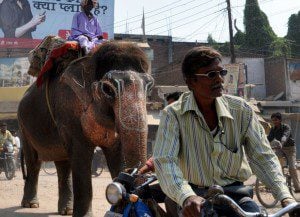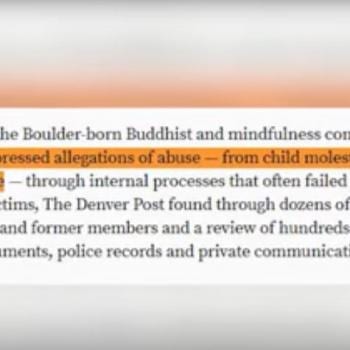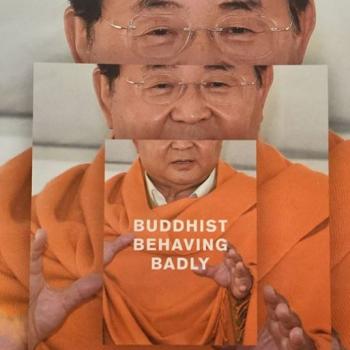
A post I wrote in August, American Buddhism: Unraveling a Scandal, drew some attention to an issue involving the “pragmatic Buddhism” teacher Ken McLeod and one of his former students, a Canadian social worker with a Ph.D. in philosophy. The issue then, to summarise, was that something inappropriate had taken place between McLeod and herself, and that she (and another unnamed individual) was seeking a healthy resolution procedure to gain closure and move forward.
The former student wrote in August that she was “ignored” by Unfettered Mind, the organization for which McLeod is listed as the principle teacher, writing of “unyeilding silence.” The response she did get was brief, and promised further consideration. You can read it here.
Beyond that there seems to have been nothing. A piece at Sweeping Zen got some deserved attention, in part for including Ken McLeod’s name “in the same breath as Richard Baker, Eido Shimano, Dennis Genpo Merzel and others whose charismatic teaching careers were marred by ethical lapses.” (as I wrote in the earlier post) Ivan has also gained some allies in calling for clearer resolution procedures, including the great Kobutsu Malone, who has shown vigilance in teacher abuse issues for some time now.
About two weeks ago, the former student did share much of her story. We’ll return to that.
Moving ahead not too far, Adam Tebbe, owner or Sweeping Zen posted yesterday (Sunday, Sept 30) a letter from Unfettered Mind’s attorney, the same one who had written the former student. In that letter Mr. Conrad (the attorney) demands an open apology to McLeod and a removal of statements about him in the above-mentioned article on that site. The letter goes on to ‘note’ that the legal costs from defending a hypothetical lawsuit over the matter “is likely to exceed $100,000.”
In response to that letter, George Draffan commented that:
In several private conversations with me during 2011 and 2012, Ken acknowledged that emotional entanglement and physical intimacies had occurred, and he acknowledged it in a conference call attended by Unfettered Mind board member Robert Conrad, myself, and others (May 21, 2012).
He continues:
Out of concern for those directly involved and for the wider community, I told Ken I would be as discrete as possible but would not participate in a cover-up. I listened and offered advice while Ken struggled to find an ethical and effective response, but he and the Unfettered Mind board have instead offered public silence and private threats, which have further confused the community and multiplied the harm.
What’s been set in motion cannot be resolved by secrecy, scandal, or lawsuits….
Indeed. But perhaps the most enlightening comment of this whole discussion also came from Draffan, who prefaced the above by stating, “As a pioneer in translating Buddhist teachings into Western culture, Ken McLeod has acute insight and broad knowledge. At the same time he is a human being with reactive patterns and blind spots.”
From the Buddhist perspective it would seem that that is the heart of the matter. We all have blind spots; we all make mistakes. But if we’re to grow and make things right, we have to acknowledge our blindnesses, failures, and weaknesses. It seems so simple. If you go to Dharma talks you probably hear this a couple times a year, from stories of Buddha facing Mara as opposed to his ‘evil’ cousin Devadatta, to the reformation of Angulimala…
On another level, all of this is important in that it makes concrete the fact that even really wonderful teachers are human. In all traditional forms of Buddhism there is the belief that one can transcend “reactive patterns and blind spots” and thus there will always be the potential for abuse of that belief. It’s better that we discuss that openly and regularly than ignoring it until people feel hurt and compelled to create their own blogs or websites to discuss these things, far away from the teacher and his/her inner circle.
Let the elephant out of the room.











